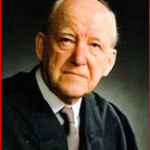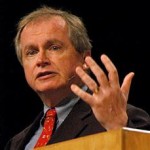Using just the Hebrew Scriptures, Paul explained and proved Jesus was the long awaited Messiah.
Acts 16:25-17:9

In this fascinating video teaching (of approximately 37 minutes), Josh McDowell walks us through the very intricate and elaborate process involved in the making of a scroll of the Hebrew Scriptures. The Jewish scribes had such great reverence for the text that it was of the utmost importance to preserve it accurately. A scribe had to undergo stringent testing before he was qualified for the task which included memorizing 4, 000 laws. This was to ensure the text would be copied, pronounced, and interpreted precisely. In the video we are also introduced to one of the rarest scrolls in the world, called the Lodz Torah Scroll.
Section 10. THE UNIVERSALITY OF GOD’S INVITATION AND THE PARTICULARITY OF ELECTION
Some object that God would be contrary to himself if he should universally invite all men to him but admit only a few as elect. Thus, in their view, the universality of the promises removes the distinction of special grace; and some moderate men speak thus, not so much to stifle the truth as to bar thorny questions, and to bridle the curiosity of many. A laudable intention, this, but the design is not to be approved, for evasion is never excusable. But those who insolently revile election offer a quibble too disgusting, an error too shameful.
I have elsewhere explained how Scripture reconciles the two notions that all are called to repentance and faith by outward preaching, yet that the spirit of repentance and faith is not given to all. Soon I shall have to repeat some of this. Now I deny what they claim, since it is false in two ways. For he who threatens that while it will rain upon one city there will be drought in another [Amos 4:7], and who elsewhere announces a famine of teaching [Amos 8:11], does not bind himself by a set law to call all men equally. And he who, forbidding Paul to speak the word in Asia [Acts 16:6], and turning him aside from Bithynia, draws him into Macedonia [Acts 16:7 ff.] thus shows that he has the right to distribute this treasure to whom he pleases. Continue reading
 From Great Doctrines of the Bible: God the Father, I would remind you that I am not insisting that the order which I shall follow is of necessity the right one, and certainly not of necessity the chronological one.
From Great Doctrines of the Bible: God the Father, I would remind you that I am not insisting that the order which I shall follow is of necessity the right one, and certainly not of necessity the chronological one.
‘So how do you arrive at your order?’ asks someone. My answer is that I mainly try to conceive of this work going on within us from the standpoint of God in eternity looking down upon men and women in sin. That is the way that appeals to me most of all; it is the way that I find most helpful. That is not to detract in any way from experience or the experiential standpoint. Some would emphasise that and would have their order according to experience, but I happen to be one of those people who is not content merely with experience. I want to know something about that experience; I want to know what I am experiencing and I want to know why I am experiencing it and how it has come about. It is the child who is content merely with enjoying the experience. If we are to grow in grace and to go forward and exercise our senses, as the author of the epistle to the Hebrews puts it (Heb. 5:14), then we must of necessity ask certain questions and be anxious to know how the things that have happened to us really have come to take place.
My approach therefore is this: there is the truth of the gospel, and we have seen already that it is a part of the work of the Holy Spirit to see that that truth is proclaimed to all and sundry. That is what we called the general call — a kind of universal offer of the gospel. Then we saw that though the external or general call comes to all, to those who will remain unsaved as well as to those who are saved, obviously some new distinction comes in, because some are saved by it. So the question we must now consider is: What is it that establishes the difference between the two groups?
And the way to answer that question, it seems to me, is to say that the call of the gospel, which has been given to all, is effectual only in some. Now there is a portion of Scripture which is a perfect illustration of this. The followers of Christ who were even described as ‘disciples’ were divided up into two groups. One group decided that they would never listen to Him again. They left Him and went home. And when He turned to the others and said, ‘Will ye also go away?’ Peter said, ‘Lord, to whom shall we go? Thou hast the word of eternal life’ ( John 6:67–68 ). The one group disbelieved and went home, the others, who had heard exactly the same things, stayed with Him, wanted to hear more, and rejoiced in it. What makes the difference? It is that the word was effectual in the case of the saved in a way that it was not effectual in the case of the unsaved who refused it.
This, then, is something that is quite obvious. We can say that in addition to the external call there is this effectual call, and that what makes anybody a saved person and a true Christian is that the call of the gospel has come effectually. Let me give you some scriptures that establish that. The first, Romans 8:28–39 , is a great statement of this very thing. ‘We know,’ says Paul, ‘that all things work together for good to them that love God … ’ Not to everybody but ‘ to them that love God ’. Who are they? ‘To them who are called according to his purpose,’ and Paul goes on: ‘For whom he did foreknow, he also did predestinate to be conformed to the image of his Son, that he might be the firstborn among many brethren. Moreover whom he did predestinate, them he also called: and whom he called, them he also justified: and whom he justified, them he also glorified.’ The saved are described as those who are called . And they have been called in a way that the others have not. That is, therefore, a scriptural statement of this effectual call. Continue reading
 Nathan Busenitz serves on the pastoral staff of Grace Church and teaches theology at The Master’s Seminary in Los Angeles. He a group of Jerry Drace (the evangelist who initiated the meeting) explained that some Baptist pastors are so Calvinistic “that they almost laugh at evangelism. It’s almost to the extent that they believe they don’t have to do it. So [Calvinism] gives them an excuse not to do evangelism.”
Nathan Busenitz serves on the pastoral staff of Grace Church and teaches theology at The Master’s Seminary in Los Angeles. He a group of Jerry Drace (the evangelist who initiated the meeting) explained that some Baptist pastors are so Calvinistic “that they almost laugh at evangelism. It’s almost to the extent that they believe they don’t have to do it. So [Calvinism] gives them an excuse not to do evangelism.”
Drace’s comments raise an important question. Does an affirmation of God’s sovereign election in salvation (commonly called “Calvinism”) discourage people from faithfulness in evangelism?Calvin and Company
An answer to that question could be approached from several different angles.
One could, for example, consider evangelistic efforts among Baptists — comparing those who embrace the doctrine of election with those who do not. An SBC study “found that Calvinistic recent graduates report that they conduct personal evangelism at a slightly higher rate than their non-Calvinistic peers.”
A better place to go, of course, would be the Word of God. There are many passages to which we could turn (from John 6 to Acts 13 to Ephesians 1); but I would start in Romans 9–10. Pardon the anachronism, but it is no accident that one of the most “Calvinistic” chapters in the Bible (Romans 9) is partnered with the one of the most “evangelistic” (Romans 10). Clearly, the apostle Paul saw no disconnect between the reality of God’s sovereignty in salvation and his own evangelistic zeal.
We could also look to church history. As Mitch Cervinka explains:
One needs only examine Protestant history to see that Calvinists have been on the forefront of evangelism and missions. George Whitefield was outspoken in affirming all five points of Calvinism, yet he was one of the most zealous and effective evangelists of the Great Awakening. Wherever he traveled, both in England and America, people would turn out by the thousands to hear him preach in the open fields. The modern missionary movement began in 1792 when the Calvinistic Baptist, William Carey, left England to minister the gospel in India. With the help of William Ward and Joshua Marshman, he founded 26 churches and 126 schools, and translated the Bible into 44 languages including Sanskrit. In 1812, Adoniram Judson, another Calvinistic Baptist, sailed to Burma, becoming the first American to depart for the overseas mission field. . . . Other Calvinistic evangelists and missionaries of note include Jonathan Edwards, Asahel Nettleton and Charles H. Spurgeon. More than this, the Protestant Reformation was perhaps the greatest evangelistic movement of modern history. The Lord brought it about through the evangelistic zeal and unfailing courage of men who believed that God is fully sovereign in salvation—men such as Martin Luther,William Tyndale, John Calvin and John Knox, as well as lesser known men such as William Farel, George Wishart, Martin Bucer, Hugh Latimer, Nicholas Ridley and countless others.
One of my favorite accounts from church history in this regard is the testimony of George Müller. When he first encountered the doctrines of grace (such as mankind’s total depravity and God’s sovereign election), Müller tried to reject them. He would later describe his initial distaste in his autobiography, “Before this period I had been much opposed to the doctrines of election, particular redemption, and final persevering grace; so much so that . . . I called election a devilish doctrine.”
But as he continued to study God’s Word, Müller reached an unexpected conclusion. He wrote:
I went to the Word, reading the New Testament from the beginning, with a particular reference to these truths. To my great astonishment I found that the passages which speak decidedly for election and persevering grace, were about four times as many as those which speak apparently against these truths; and even those few, shortly after, when I had examined and understood them, served to confirm me in the above doctrines.
Müller initially feared that embracing the doctrine of election would quench his passion for evangelism. But he soon found it had the opposite effect. Consequently, he noted:
In the course of time . . . it pleased God then to show to me the doctrines of grace in a way in which I had not seen them before. At first I hated them, “If this were true I could do nothing at all in the conversion of sinners, as all would depend upon God and the working of His Spirit.” But when it pleased God to reveal these truths to me, and my heart was brought to such a state that I could say, “I am not only content simply to be a hammer, an axe, or a saw, in God’s hands; but I shall count it an honor to be taken up and used by Him in any way; and if sinners are converted through my instrumentality, from my inmost soul I will give Him all the glory;” the Lord gave me to see fruit; the Lord gave me to see fruit in abundance; sinners were converted by scores; and ever since God has used me in one way or other in His service.
That perspective fueled Müller’s evangelistic zeal — from the 10,000 orphans he helped to care for in England to the over 200,000 miles he traveled as an itinerant evangelist, taking the gospel to dozens of foreign nations. Müller’s example is one of many powerful answers, from history, to those who would allege that an affirmation of God’s sovereignty in salvation kills evangelism.
Whether we look to Scripture or church history, we quickly learn that a belief in God’s sovereign election — properly understood — is no deterrent to a passionate witness. In reality, it has the opposite effect.
A right understanding actually motivates the missionary spirit. As Charles Spurgeon explained to his students, “We must have the heathen converted; God has myriads of His elect among them, we must go and search for them somehow or other.”
That is the kind of passion for evangelism that ought to characterize all who call themselves “Calvinists.” If it doesn’t, it calls into question the authenticity of the label.
From The Master’s Seminary (http://www.tms.edu/), Dr. John MacArthur and Dr. Steven Lawson teach a course on Expository Preaching.
Lecture 1 – John MacArthur: “Consequences of Non-Expository Preaching, Part I”
Lecture 2 – John MacArthur: “Consequences of Non-Expository Preaching, Part II”
Lecture 3 – John MacArthur: “Consequences of Non-Expository Preaching, Part III”
Lecture 4 – Steven Lawson: “The Meaning of Expository Preaching”
Lecture 5 – Steven Lawson: “The Marks of Expository Preaching, Part I”
Lecture 6 – Steven Lawson: “The Meaning of Expository Preaching, Part II”
Lecture 7 – Steven Lawson: “The Meaning of Expository Preaching, Part III”
Lecture 8 – Steven Lawson: “The Method of Expository Preaching, Part I”
Lecture 9 – Steven Lawson: “The Method of Expository Preaching, Part II”
Lecture 10 – Steve Lawson: “The Method of Expository Preaching, Part III”
 The heart of Reformed Theology or Calvinism is the cross of Jesus Christ … that all redemptive blessings flow from Him alone (Eph 1:3). That His Person and work is sufficient. That salvation is all of grace because it is all of Christ. It is a sign of a corrupted doctrine which teaches anything in addition to Christ …i.e. that man must (at least partly) either attain or maintain his own just standing before God. Now you either believe one or the other.. If you believe that Jesus is not sufficient to save you to the uttermost, then you embrace a theology to a greater or lesser degree like Roman Catholicism (Gal 3:3).
The heart of Reformed Theology or Calvinism is the cross of Jesus Christ … that all redemptive blessings flow from Him alone (Eph 1:3). That His Person and work is sufficient. That salvation is all of grace because it is all of Christ. It is a sign of a corrupted doctrine which teaches anything in addition to Christ …i.e. that man must (at least partly) either attain or maintain his own just standing before God. Now you either believe one or the other.. If you believe that Jesus is not sufficient to save you to the uttermost, then you embrace a theology to a greater or lesser degree like Roman Catholicism (Gal 3:3).
One of the main purposes of the five points of Calvinism is to demonstrate that the Scripture would always turn our trust entirely back to Christ: if you reject say, irresistible grace, then you reject or downplay the sufficiency of Christ, who provides EVERYTHING we need for salvation, including a new heart to believe (see Deut 29:4, 30:6; Ezek 36:26; John 6:63, 65, 37; 1 Pet 1:3). The same goes for preservation of the saints (which Jesus also teaches ex. John 6:37-40). If one believes they can lose salvation it is like saying that what Jesus did was not really sufficient … THAT WE must (at least partly) maintain our own just standing before God… So the five points (which are all grounded in Scripture) are simply a way to demonstrate that “salvation is of the Lord” … that it is “because of him you are in Christ Jesus, who became to us wisdom from God, righteousness and sanctification and redemption, so that, as it is written, “Let the one who boasts, boast in the Lord.” (1 Cor 1:30-31)
– John Hendryx
 Michael J. Kruger is professor of New Testament at Reformed Theological Seminary in Charlotte, 2012). He blogs regularly at Canon Fodder. In an article at The Gospel Coalition he writes:
Michael J. Kruger is professor of New Testament at Reformed Theological Seminary in Charlotte, 2012). He blogs regularly at Canon Fodder. In an article at The Gospel Coalition he writes:
Skeptics commonly criticize core Christian beliefs by claiming that they were not really held by the earliest Christians. Instead, we are told, these beliefs were invented post facto by the institutional church.
The classic example of such an argument has to do with the divinity of Jesus. The earliest followers of Jesus didn’t really believe that Jesus was divine, this argument goes; it was only the later institutional church, under political pressure from Emperor Constantine, that insisted Jesus must have divine status. Thus, some argue, the belief that Jesus is God is not really, well, Christian.
Substitutionary Atonement
This same sort of argument has also been applied to other doctrines, particularly the substitutionary nature of the atonement. Critical scholars, led by the classic work of Gustaf Aulén, have long argued that the earliest Christians did not believe that Christ died as a substitute for sinners. Instead, they say, these Christians believed what is known as the “Christus victor” view of the atonement—the idea that Jesus’s death on the cross (and resurrection) conquered the Devil and other forces that held people in bondage. On this view, Christ did not die in place of rebellious sinners but instead rescued victims from a fallen world.
If Aulén is correct, then when did the substitutionary view of the atonement arise? Peter Carnley embodies the typical critical approach when he says that the substitutionary view “was not known before Anselm’s time.” Thus, Carnley claims, it was not until the Middle Ages, when Anselm wrote Cur Deus Homo (Why the God-Man?), that Christians began to believe Christ died in place of sinners.
No doubt these sorts of scholarly arguments can explain why alternative theories of the atonement have gained popularity in recent years, while the substitutionary view continues to be vilified as un-Christian. Rob Bell does precisely this in his book Love Wins, where he roundly rejects the substitutionary view in favor of other options.
But is it really true that the substitutionary view of the atonement was not found before the Middle Ages? Not at all. Such a claim can be readily refuted merely by examining the writings of the New Testament itself—particularly the letters of Paul. However, it is also worth noting that key elements of the substitutionary view were held by some of the earliest Christian writers. One example is the author of the Epistle to Diognetus from the early second century. The Epistle to Diognetus was written by an unknown Greek author as an apology for Christianity. Below are some excerpts from the author that affirm key aspects of substitutionary atonement. Continue reading
 Dr. D. A. Carson go and tell him his fault, between you and him alone. If he listens to you, you have gained your brother. 16 But if he does not listen, take one or two others along with you, that every charge may be established by the evidence of two or three witnesses. 17 If he refuses to listen to them, tell it to the church. And if he refuses to listen even to the church, let him be to you as a Gentile and a tax collector. 18 Truly, I say to you, whatever you bind on earth shall be bound in heaven, and whatever you loose on earth shall be loosed in heaven. 19 Again I say to you, if two of you agree on earth about anything they ask, it will be done for them by my Father in heaven. 20 For where two or three are gathered in my name, there am I among them.”
Dr. D. A. Carson go and tell him his fault, between you and him alone. If he listens to you, you have gained your brother. 16 But if he does not listen, take one or two others along with you, that every charge may be established by the evidence of two or three witnesses. 17 If he refuses to listen to them, tell it to the church. And if he refuses to listen even to the church, let him be to you as a Gentile and a tax collector. 18 Truly, I say to you, whatever you bind on earth shall be bound in heaven, and whatever you loose on earth shall be loosed in heaven. 19 Again I say to you, if two of you agree on earth about anything they ask, it will be done for them by my Father in heaven. 20 For where two or three are gathered in my name, there am I among them.”
Several years ago I wrote a fairly restrained critique of the emerging church movement as it then existed, before it morphed into its present diverse configurations.1 That little book earned me some of the angriest, bitterness-laced emails I have ever received—to say nothing, of course, of the blog posts. There were other responses, of course—some approving and grateful, some thoughtful and wanting to dialogue. But the ones that displayed the greatest intensity were those whose indignation was white hot because I had not first approached privately those whose positions I had criticized in the book. What a hypocrite I was—criticizing my brothers on ostensible biblical grounds when I myself was not following the Bible’s mandate to observe a certain procedure nicely laid out in Matt 18:15–17.
Doubtless this sort of charge is becoming more common. It is regularly linked to the “Gotcha!” mentality that many bloggers and their respondents seem to foster. Person A writes a book criticizing some element or other of historic Christian confessionalism. A few bloggers respond with more heat than light. Person B writes a blog with some substance, responding to Person A. The blogosphere lights up with attacks on Person B, many of them asking Person B rather accusingly, “Did you communicate with Person A in private first? If not, aren’t you guilty of violating what Jesus taught us in Matthew 18?” This pattern of counter-attack, with minor variations, is flourishing.
To which at least three things must be said:
(1) The sin described in the context of Matt 18:15–17 takes place on the small scale of what transpires in a local church (which is certainly what is envisaged in the words “tell it to the church”). It is not talking about a widely circulated publication designed to turn large numbers of people in many parts of the world away from historic confessionalism. This latter sort of sin is very public and is already doing damage; it needs to be confronted and its damage undone in an equally public way. This is quite different from, say, the situation where a believer discovers that a brother has been breaking his marriage vows by sleeping with someone other than his wife, and goes to him privately, then with one other, in the hope of bringing about genuine repentance and contrition, and only then brings the matter to the church.
To put the matter differently, the impression one derives from reading Matt 18 is that the sin in question is not, at first, publicly noticed (unlike the publication of a foolish but influential book). It is relatively private, noticed by one or two believers, yet serious enough to be brought to the attention of the church if the offender refuses to turn away from it. By contrast, when NT writers have to deal with false teaching, another note is struck: the godly elder “must hold firmly to the trustworthy message as it has been taught, so that he can encourage others by sound doctrine and refute those who oppose it” (Titus 1:9 NIV). Continue reading